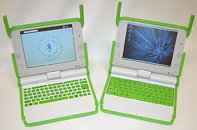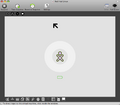News Posts matching #OLPC
Return to Keyword Browsing
One Laptop per Child Association (OLPCA), the world-renowned project to provide a modern education to children through a connected computing device, announced today that it will introduce at CES three new products. OLPCA will unveil for the first time the XO Learning System, an Android compatible software suite for child-centric learning, which is available by license to computer manufacturers, governments, NGOs and content providers such as book publishers. Tablets under such a license will be called the XO Tablet, the second product announcement. Third, OLPCA will show the fourth generation of its iconic green and white laptop with both a keyboard and a multi-touch screen using Neonode technology.
Every child has dreams and XO Learning directs the child's passion, creativity and energy for these dreams into a new user interface that has 12 dreams. Such dreams include "I want to be" an artist, a musician and a scientist. Each dream features a rich learning experience and applications, books, games and videos that allow children ages 3 to 12 to naturally explore their dreams and learn at the same time.
One Laptop per Child (OLPC), a nonprofit organization whose mission is to provide every child in the world access to new channels of learning, sharing and self-expression, announced today that the Islamic Development Bank has fully funded the initial distribution of 5,000 XO laptops to primary school children in the West African nation of Cameroon. The project will initially span 51 schools in six regions; planning is underway to extend the deployment across the entire country.
The Islamic Development Bank is a multilateral financing institution whose purpose is to foster the economic development and social progress of its 56 member countries - of which Cameroon is one. The Cameroon project represents the first time that the Islamic Development has financed an OLPC deployment.
On the opening day of the 2012 Annual Meeting of the Inter-American Development Bank, One Laptop per Child (OLPC), a nonprofit organization whose mission is to provide every child in the world access to new channels of learning, sharing and self-expression, announced that Uruguay will be the first country in the world to receive the newest model XO children's laptop.
Uruguay began working with OLPC in 2007 and by mid-2010 achieved complete laptop saturation, providing XO's to all 570,000 primary school children in the country. The project recently ordered 60,000 XO 1.75's in order to take advantage of the many breakthrough hardware and software features in the new model.
Marvell, a worldwide leader in integrated silicon solutions, today announced new education solutions designed to enable "Classroom 3.0," a connected, secure learning environment that simplifies and speeds the deployment of technology to students around the world. Marvell's collaboration with Stanford University has resulted in the Marvell SMILE Plug, the first plug development kit designed to turn a traditional classroom into a highly interactive learning environment. Designed to engage students in critical reasoning and problem solving, the SMILE Plug creates a "micro cloud" within a classroom that is completely controlled by the teacher. Marvell also announced that it has extended its relationship with the One Laptop per Child Association (OPLC) on a number of new products, including the upcoming OLPC X0 3.0, a low cost, low power tablet designed for education.

Last Friday, One Laptop Per Child (OLPC) organization announced that it is leaving Advanced Micro Devices (AMD) as main processor partner in favour of VIA Technologies. This is a step that will lower the price of OLPC's laptop further. From this point on VIA's C7-M processor instead of AMD's Geode will power OLPC's XO-1 laptops. The processor will be a VIA C7-M, with plans on using one whose clock speed ranges from 400 MHz (1.5 W) to 1 GHz (5 W). The clock may be throttled back automatically if necessary to meet thermal constraints. Gen 1.5 XO-1 laptop will come with the VIA VX855 all-in-one chipset solution, as well as with an updated HD Audio sound. The upgraded XO laptops will also include 1 GB of RAM and between 4 GB and 8 GB of storage, which is considerably more than the currently existing XO systems with 256 MB RAM and 1 GB of storage. There are two more changes being made, the network interface will be upgraded to an 88W8686 with wake-up functions, which halves the power consumption of current XO-1 network adapter, and a new OLPC OS 8.2.x will be installed to support all the hardware variations. Overall, the Gen 1.5 XO-1 laptop will remain the same from the outside - same display, same form, same power consumption, probably the same price - but come with upgraded internals.
Early versions of the hardware (bare board) should be available for driver development at the end of May. A larger number of prototype laptops (several hundred) for software development and testing will become available around the end of August. It's unclear when children will get their hands on the final product, though.
In an attempt to empower millions of students across the country, Indian Government agencies have formulated plans to release a laptop at prices that equal that of a trip to a pizzeria in the west. Under a Government-sponsored scheme that runs parallel to the One Laptop Per Child (OLPC) global initiative, the administration sought to implement this scheme to make the computer up to 10 times more affordable than an OLPC. The Government believes that the hidden costs involved in deploying laptops under the OLPC scheme make it still inaccessible to the larger student population, and that much better hardware could be provided at its cost.
The first thing that comes to your mind would probably be the kind of hardware that would make such a cheap laptop. Earliest data trickling in about the specifications indicates each laptop to have about 2 GB of memory, and support wireless networking. We will attempt to find out more about the hardware in the days to come. The Indian Government has reportedly spent close to US $1.5 billion on developing this concept and researching solutions to make this notebook durable and worthy of deployment to the most remote rural areas, that suffer power-outages and voltage fluctuations. Higher Education Secretary R.P. Agrawal said last week that it would be available within six months. The public education scheme governing the deployment of these laptops was flagged off today, in the southern-Indian city of Tirupati. The laptop will be available to students on a priority basis, and will later reach mass-retail channels in the country.

Local computer manufacturers unveiled the Intel-powered convertible classmate PC designs, joining the existing clamshell design to meet the variety of elementary school students' needs worldwide. The new flexible design, based on Intel Corporation technologies, converts instantly from a clamshell to a tablet mode with a touch screen to allow for a more intuitive classroom experience. According to research with students and teachers, the 180-degree swivel design, rotational camera and touch screen encourage flexible classroom interaction and natural collaboration. Both the convertible and the clamshell classmate PC designs are based on ethnographic studies and feedback from pilot programs conducted in both mature and emerging markets.
This morning in Cambridge, Mass., at OLPC's Global Country Workshop, OLPC founder Nicholas Negroponte announced the second generation of OLPC (One Laptop Per Child) XO laptops. Negroponte didn't share many details about the XO 2.0's hardware, but from the quick press coverage we can learn that the XO 2.0 will be half the size of the original machine, and will boast one-of-a-kind flip design with two touch sensitive displays. "The next generation laptop should be a book," Negroponte said. The design will provide a right and left page in vertical format, a hinged laptop in horizontal format, and a flat, two-screen continuous surface for use in tablet mode. "Younger children will be able to use simple keyboards to get going, and older children will be able to switch between keyboards customized for applications as well as for multiple languages," the press release reads. The XO 2.0 is scheduled to be released in 2010 with a price tag of $75, but this sounds a bit unrealistic at this point, after all we are still in 2008.


Using cheap parts to build computers, leads in most cases to a serial failure in some of the PCs components, and OLPC's 'Give 1 Get 1' XO laptops are no exception. Many participants in the program are now encountering what has come to be known as the 'stuck key' problem, in which one or more of the keys on their XO-1 laptop's built-in keyboard become stuck in an activated position, or are activated when adjacent keys are pressed. As of January 30th, the official word from OLPC is that the root cause of this problem is unknown because "there are several manufacturers of the keyboards". It is also unknown just how widespread this problem currently is, as the 30-day manufacturer's warranty has already expired for most G1G1 participants. However, the OLPC forums are
full of reports. OLPC is currently deploying the XO-1 to children in Mongolia and Peru, as well as other developing nations. Meanwhile, members of the forums are also reporting that by taking the keyboard out of the XO laptop and rubbing on the underlying sensor, you might fix the stuck key, but that's not a 100% solution. There's also a workaround, to disable the stuck key and assign its function to other key of the keyboard by typing
these commands.
Our new day is starting with a lot of processor news. This story again will lead us to the heart of every personal computer, the CPU. Since the start of the One Laptop Per Child project, and its first born the OLPC XO laptop, users were complaining how slow the 433MHz Geode LX 700 CPU was. Now, thanks to the user bdleonard on
OLPC News XO Hacks Forum who created a full guide, the OLPC XO CPU FSB and its PC2700 (166MHz DDR SDRAM) memory can be overclocked. Initial tests show that the Geode LX 700 CPU can be pushed up to 566MHz resulting in 30% overall improvement in processor speed over the stock 433MHz. Please know that overclocking may cause stability problems, data errors, and possibly hardware damage, and will generate excessive heat, a concern with the passively cooled XO laptop. Overclock at your own risk!
Complete Guide of OLPC XO Laptop OverclockingThe One Laptop Per Child project feels sorry for the Intel loss, said Nicholas Negroponte, chairman of OLPC, in an interview. "It was very unfortunate what happened with Intel and I hope there's a way of rebuilding it in the future because there's no interest in OLPC pushing Intel out. It just is not in our interest. Our goal is to get this to as many children as possible," he said. He called it unfortunate that Intel made statements that OLPC asked the chip maker to stop working on the Classmate PC. "The picture that painted was one of OLPC being anti-competition, which is ridiculous. We'd like to see as many laptops out there as possible and kids have the widest choice possible," On the other hand Agnes Kwan, an Intel manager responded that Intel would be willing to talk with OLPC, but she added that the organizational break-up came about because of differences that the groups have been so far unable to resolve.
Can you imagine having a laptop which costs just 75$, the current price of a 120GB mobile hard drive? Well, this may become reality if the new venture formed by former chief technology officer of One Laptop Per Child (OLPC), Mary Lou Jepsen, can deliver on its promises. Jepsen left OLPC two weeks ago to form Pixel Qi, a company that's in "currently pursuing the $75 laptop, while also aiming to bring sunlight readable, low-cost and low-power screens into mainstream laptops, cellphones and digital cameras." As Chief technical officer, Jepsen was responsible for hardware development for the rugged and power-saving XO laptop, designed for use by children in developing countries. Currently this is only a bright project, no details, no specifications, no pics, no release date were announced. We're looking forward to seeing it in the hardware stores near-by.

More bad news for the One Laptop per Child (OLPC) project, fortunately this time nobody asks for $20 million in lawsuit. After only six months Intel has announced it is leaving the One Laptop Per Child project. According to Intel, Negroponte asked the chipmaker to stop selling its Classmate PC while it was part of the OLPC, which is currently shipping its XO laptop based on a chip from AMD. Even more surprising, Intel is saying that the OLPC actually asked the chipmaker to stop working with any company that produces low-cost laptops, such as Asus' Eee PC. "It is basically a philosophical impasse and, as a consequence, we've decided to go our separate ways," said Intel Asia-Pacific spokesman Nick Jacobs. "Despite many months of work to align Intel and OLPC, fundamental differences remain in our respective approaches to the challenge of bringing technology into education. Intel remains a strong supporter of OLPC's philanthropic goals, but we were unable to agree to some of their requests ... most notably that we cease support for non-OLPC platforms including the Classmate PC."
Some readers may remember the story
posted on techPowerUp! at the end of November about a Nigerian firm which was trying to sue the non-profit
One Laptop Per Child project regarding some of the features on the XO laptop's keyboard. According to
Groklaw, this lawsuit has now begun and an interim injunction is preventing the laptop being distributed in Nigeria - an interim which could potentially last for months. The Nigerian firm, known as Lagos Analysis Corp (LANCOR), is also seeking a permanent injunction and
$20 million in damages. The OLPC project did not appear in court but it is expected to "aggressively respond shortly" according to the site.

While for a while, things were not looking too good for the One Laptop Per Child (OLPC) project, things seem to have turned around quite nicely. Quite a few countries around the world have placed in orders for large quantities of the OLPC. Peru is proud to announce that it has added itself to that list. The 260,000 laptops en route to Peru will be placed in classrooms as soon as possible. However, don't be so sure if they order will fall through. In Libya, just when the Libyan government and OLPC heads were finalizing the paperwork, Intel came in and agreed to sell Libya a lot of Intel Classmate PCs.
No doubt most techPowerUp! readers will have heard of the
One Laptop Per Child project which aims to help developing companies by providing them with cheap (the aim is $100 eventually) laptops, primarily focused on education purposes. However, the project could face some trouble as a Nigerian firm,
Lagos Analysis Corp., is now trying to sue the OLPC foundation for illegally reverse engineering the company's software drivers in order to make the keypad on the laptops more accent mark friendly to users. According to
Lagos Analysis Corp., the 'alt gr' key on the laptop's keyboard has the same functionality as the 'shift2' button on the firm's own keyboard. The OLPC foundation has responded with the following comment:
One Laptop per Child, a non-profit educational organization, has hear that Lagos Analysis Corp. (LANCOR) has sued OLPC in Nigeria, but OLPC has not seen any legal papers related to the alleged suit at this time. OLPC has the utmost respect for the rights of intellectual property owners. To OLPC's knowledge, all of the intellectual property used in the XO Laptop is either owned by OLPC or properly licensed. Until we have a copy of the claim and have had time to review it, we will not be commenting further on the matter.
OLPC Buy One, Give One program has been extended to 31 December, 2007 - well beyond the initial two-weeks originally planned when the program started on November 12th. "Because so many people have asked for more time to participate either individually or in order to organize local and national groups to which they belong, we have decided to extend Give One Get One through the end of this year," said Nicholas Negroponte, founder and chairman of One Laptop per Child. "During this extended period we will solicit input and transition to a program of giving only at the beginning of 2008. We want as many people as possible to have the opportunity to act upon the giving spirit of the holiday season."

In a 1-for-2 deal, the OLPC founders will ship you your very own OLPC XO, if you give them a $400 donation, which will be put toward buying a child in need their very own laptop computer. If you would like to give a laptop to someone in need, please check out this
website. Half of the $400 donation is tax-deductable, and will earn you free access to the T-Mobile HotSpot Wi-Fi service for one year. The OLPC project at this point is doing quite well, with offers coming in from several countries asking for several hundred thousand laptops, mass production starting last week, and EA promising to pre-load the original Sim City on each laptop.

Electronic Arts will be giving a lot of disenfranchised children the gift of educational gaming this holiday season. The original SimCity, a game that simulates the construction of a city, will be pre-installed on all versions of the OLPC, at no additional cost to either OLPC or the customer. The request for SimCity came from OLPC itself, and the 1989 version of the classic game will find a way to such countries as Cambodia, Libya, Nigeria (which ordered over a million OLPC laptops), Pakistan, and Peru. This is the first time a major company has "gifted a game to the world" like this, especially a game that has earned 24 awards in the past.
One Laptop per Child (OLPC), a non-profit organization launched in 2005 by MIT professor Nicholas Negroponte to design, manufacture and distribute affordable laptop computers to children around the world, announced that mass production of the XO laptop computer began on November 6th at Quanta Computer's manufacturing facility in Changshu, China. Taiwan-based Quanta Computer has recently doubled its manufacturing capacity, in part to prepare for the production of the XO laptop from OLPC. The commencement of mass production means that children in developing nations will receive XO laptops starting this month, stated OPLC. Residents of the US and Canada participating in the
Give 1 Get 1 program (November 12 - 26) will start receiving laptops in December 2007.

While countries such as Nigeria have been experimenting with the OLPC in the classroom, Uruguay is the first country confident enough in the OLPC to place an official order. The South American country of Uruguay recently placed an order for 100,000 OLPCs, to be deployed in classrooms for 6-12 year old schoolchildren. An additional 300,000 OLPCs may be ordered by Uruguay to truly achieve "one laptop per child" by 2009. The founder of the OLPC project is "delighted" by their first official order.
We commend Uruguay for being the first country to take concrete actions to provide laptops to all its children and teachers and look forward to other countries following this example

Software giant Microsoft is making progress in creating a modified version of its Windows operating system designed to run on the XO laptop built by the One Laptop Per Child project. Microsoft Corporate Vice President Will Poole said:
We're spending a nontrivial amount of money on it. We remain hopeful with our progress to date, we still have significant work ahead to finalize our analysis and testing processes. At the end of the day, there's no guarantees.
The OLPC project intends to start producing its laptop next month, which is designed for elementary school children in developing countries in Asia, Africa and Latin America. The laptops were originally designed to run Linux, however Microsoft hopes to develop a cut-down version of Windows in order to install it on the XO, with the biggest issues being reducing the power consumption and the space required by the operating system in order for it to run efficiently.
Many techPowerUp! readers will be aware of the One Laptop Per Child project, which aims to provide $100 laptops to children in developing countries. David Pogue from The New York Times has managed to get his hands on one of these laptops and given it a thorough testing, and the overall verdict is that the laptop is very impressive. Pogue praises features such as the sunlight-readable screen, the cheap and long-lasting battery and the WiFi mesh capability, as well as being impressed by how well the applications on the machine work. The laptop even survives a few drop and spill tests, which can be watched alongside the article on
The New York Times' website. It is well worth reading if you are interested by the project - if you want to know more about it, visit the
OLPC website.
Thanks to the magic of VMWare and Parallels you can try the new OLPC operating system without actually having to be a child in a Third World country. All you have to do is download a pre-configured image, change certain settings and you're set to go. Aside from being able to see what kids in Nigeria saw when they first started their odyssey people can also develop OLPC-specific software and web apps for the upcoming market.
Nigerian schoolchildren have recently gotten the first batch of donated laptops from the One Laptop Per Child project
(Laptop.org). Ideally, they would be using their brand new laptops to discover the world, get a head start in school, and excel in the competitive business world we live in.
So what do the Nigerian schoolchildren do? They watch all the pornography they can find all day long, and then store it on the 1GB SSD on each laptop. Nigerian officials are very upset that the OLPCs are being used to watch pornography, and in response, the developers of OLPC are putting filters in future versions of it.















